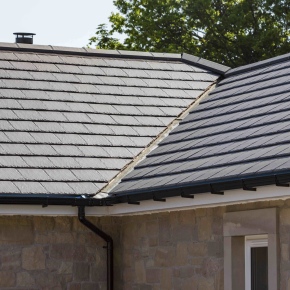
Roofing industry adapts for skills shortage
With skilled workers in short supply, new, easier to install tiling systems are an ideal solution. Richard Bishop, Category Marketing Manager for Roof at Wienerberger, looks at the market, and current trends in clay tiling.
Traditional plain tiles, pan tiles and large format clay tiles form the backbone of the British roofs cape alongside natural slate. However, skilled workers are required to use and install these tiles correctly.
With the skills shortage in full flow, interlocking tiles are being favoured as roofers can now complete the work in a more efficient way. Therefore, roofing solutions manufacturers, such as Wienerberger, is designing and producing tiles that are much simpler to install.
Although the tiling technique is easier, the finished look is just as aesthetically pleasing. Wienerberger constantly strives to achieve beautiful roofing that is easier to install and suits every need, Richard explains.
The emergence of these interlocking tiles means that the product is being specifically sought out and used by new types of installers, including builders who would usually sub contract to a roofer.
Due to growing popularity, all of Wienerberger’s ranges feature the interlock system and the simple to use product has become the introductory level to the various markets.
Clay products still have the ability to meet all required roofing regulations, whilst experienced roofers that are trained in traditional laying methods are still able to use mortar and follow the NHBC mixing guidelines, along with simple mechanical fixing techniques.
As concrete tiles have become cheaper, clay tiles have been required to adapt and progress. Clay roof tiles are easy to lay due to the interlocking mechanism, whilst still boasting the premium feel and style associated with the material.
Traditional lay roof tiles are extremely popular within the industry with the versatility of the clay meaning that the tiles can be used almost anywhere and for all architectural styles. The clay product can also be utilised to create variations that are styled on other materials, such as slate.
As there is no need for drilling, the product offers substantial cost savings and time savings through the installation process. In addition, the clay also means that the tiles will last for a lifetime, with several examples of clay-tiled pitched roofs lasting over a hundred years.
Visit Supplier's page
Latest news

28th April 2025
Nuaire first UK ventilation manufacturer to use low carbon-emissions recycled & renewably produced steel
Nuaire has announced that its Magnelis® steel based ventilations systems are now being made from XCarb® recycled and renewably produced steel.
Posted in Air Conditioning, Articles, Building Industry News, Building Products & Structures, Building Services, Building Systems, Heating, Ventilation and Air Conditioning - HVAC, Restoration & Refurbishment, Retrofit & Renovation, Steel and Structural Frames, Sustainability & Energy Efficiency, Waste Management & Recycling
28th April 2025
Renderplas: Builders avoid costly remedial work with PVCu render beads
A pioneer of PVCu render beads, Renderplas is helping the construction industry avoid the costly remedial work associated with rusting steel designs…
Posted in Articles, Building Industry News, Building Products & Structures, Building Services, Building Systems, Facades, Posts, Render, Restoration & Refurbishment, Retrofit & Renovation, Sustainability & Energy Efficiency, Walls
28th April 2025
How Celotex’s Technical Team adds value through expert insulation support
From U-value calculations to real-world installation support, Celotex’s technical team helps construction professionals specify and install insulation with confidence…
Posted in Articles, Building Industry News, Building Products & Structures, Building Services, Insulation, Research & Materials Testing, Restoration & Refurbishment, Retrofit & Renovation, Sustainability & Energy Efficiency, Walls
28th April 2025
Ideal Heating Commercial takes extra care with the heat network at Huddersfield specialist housing development
Ideal Heating Commercial POD Heat Interface Units (HIUs) and Evomax 2 condensing boilers have been installed into Ash View Extra Care in Huddersfield.
Posted in Articles, Building Industry News, Building Products & Structures, Building Services, Case Studies, Facility Management & Building Services, Heating Systems, Controls and Management, Heating, Ventilation and Air Conditioning - HVAC, Pipes & Fittings, Plumbing, Restoration & Refurbishment, Retrofit & Renovation
 Sign up:
Sign up: